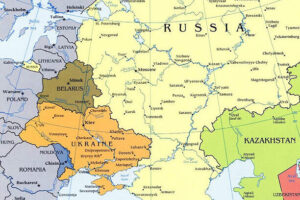JRL NEWSLINK: “6 Ideas to Explore: Russia Analytical Report, Aug. 15-22, 2022” – Russia Matters

1. Russian leadership expects a long war in Ukraine and, according to Vladimir Putin, the United States is the one “attempting to draw out this conflict.” Unsurprisingly, Putin’s proposition is shared by his senior diplomats. Gennady Gatilov, Russia’s permanent representative to the U.N. in Geneva, has told FT that he expects a long conflict. “And the more the conflict goes on, the more difficult it will be to have a diplomatic solution,” Gatilov warns. The Russian leadership’s expectation that the conflict will turn into “long-term, positional” warfare follows from the Kremlin’s decision to begin forming volunteer battalions in Russia’s regions to then be sent to the front, according to Nikolai Petrov of RUSI.
2. Western policymakers have also concluded the war in Ukraine will “settle into a prolonged stalemate,” according to John Mearsheimer. Such a protracted conflict generates “underappreciated risks of a catastrophic escalation” that could involve direct fighting between U.S. and Russian militaries, with Moscow eventually resorting to the use of nuclear weapons, according to the University of Chicago professor. “This perilous situation creates a powerful incentive to find a diplomatic solution [but] regrettably, … both sides are firmly committed to war aims that make compromise almost impossible,” he writes in FA.
3. Letting the Russian-Ukrainian war drag on could lead to a Russia-NATO escalation of the kind seen during WWI, according to Henry Kissinger. Therefore, there must be a negotiation that would provide for Russia’s return “to the line that existed when the war started,” in Kissinger’s view. Such a return would still mean Russia’s loss, according to Kissinger. “Russia on one level has lost already the war … in the sense that the old idea that Russia could just march into Europe and unfold itself, that has ended, because they can’t even defeat Ukraine, so they can’t defeat NATO so it’s impossible to have a relationship with Russia in which Russia considers itself part of Europe,” Kissinger explained to CNN.
4. Russia’s deputy chief diplomat doesn’t rule out a nuclear conflict with NATO over Ukraine. When asked whether the war in Ukraine could eventually lead to a nuclear exchange between Russian and NATO forces, Russia’s Deputy Foreign Minister Sergei Ryabkov conceded that further escalation could lead to a “military clash of nuclear powers with dire consequences.” At the same time, the senior diplomat essentially stuck to the language on nuclear weapons use in Russia’s strategic documents, when describing when Russia could resort to nuclear arms. “Russia hypothetically allows a nuclear response only in response to aggression using WMD against us or our allies, or aggression using conventional weapons, when the very existence of the state is threatened,” he said.
5. Russians’ inability to influence their country’s policies through elections makes invoking collective responsibility for the war in Ukraine problematic, according to Sergey Radchenko. “At least in democratic societies, one can plausibly argue in favor of collective responsibility based on free and fair electoral outcomes,” he notes. “There are many Russians who shamefully support Putin’s hideous aggression in Ukraine,” he writes in MT, “I will judge them individually, and let myself be judged, too, but only to the extent that they and I are personally responsible for specific crimes and misdeeds.”
6. Few Ukrainians will shed tears for Alexander Dugin, whose daughter was killed in a car bombing allegedly meant to target this far-right Russian philosopher, according to Gideon Rachman. “But others, further from the conflict, may find it harder to believe that anyone deserves to see their child blown up in front of them,” even if the father of that child called for Russians to “kill, kill, kill” Ukrainians, according to this FT columnist.
